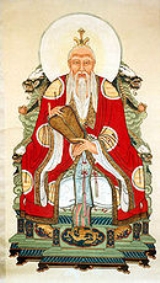
of ancient
China
, best known as the author of the Tao Te Ching
(often simply referred to as Laozi). His association with the Tao Te Ching has led him to be traditionally considered the founder of Taoism
. He is also revered as a deity in most religious forms of Taoist philosophy, which often refers to Laozi as Taishang Laojun, or "One of the Three Pure Ones
".
Laozi is an honorific title.
The Tao that can be told is not the eternal Tao; The name that can be named is not the eternal name. The nameless is the beginning of heaven and earth. The named is the mother of ten thousand things. Ever desireless, one can see the mystery. Ever desiring, one can see the manifestations. These two spring from the same source but differ in name; this appears as darkness. Darkness within darkness. The gate to all mystery.![]()
The way you can go isn't the real way. The name you can say isn't the real name. Heaven and earth begin in the unnamed: name's the mother of the ten thousand things. So the unwanting soul sees what's hidden, and the ever-wanting soul sees only what it wants. Two things, one origin, but different in name, whose identity is mystery. Mystery of all mysteries! The door to the hidden.![]()
The Tao is like a well: used but never used up. It is like the eternal void: filled with infinite possibilities. It is hidden but always present. I don't know who gave birth to it. It is older than God.![]()
The Tao is like a bellows: it is empty yet infinitely capable. The more you use it, the more it produces; the more you talk of it, the less you understand.![]()
The Tao is called the Great Mother: empty yet inexhaustible, it gives birth to infinite worlds.![]()
The universe is deathless; Is deathless because, having no finite self, it stays infinite. A sound man by not advancing himself stays the further ahead of himself, By not confining himself to himself sustains himself outside himself: By never being an end in himself he endlessly becomes himself.![]()
Thirty spokes unite at the single hub;It is the empty space which makes the wheel useful.Mold clay to form a bowl;It is the empty space which makes the bowl useful.Cut out windows and doors;It is the empty space which makes the room useful.![]()

